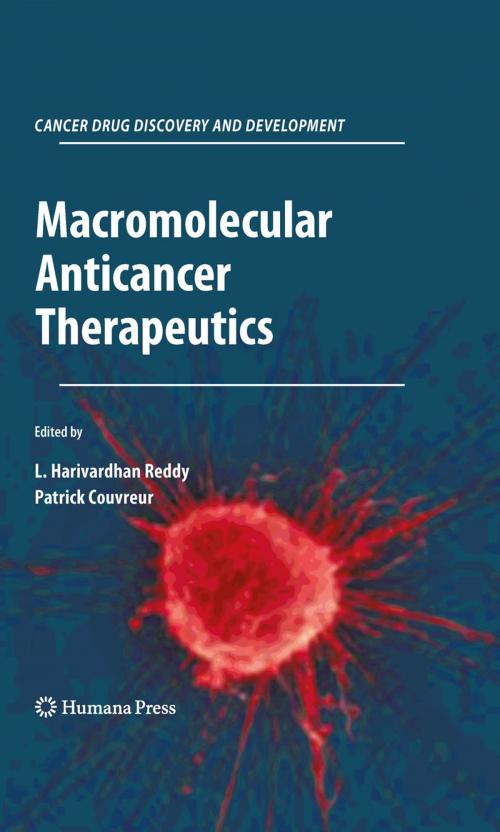Macromolecular Anticancer Therapeutics
Nonfiction, Health & Well Being, Medical, Specialties, Oncology, Medical Science, Pharmacology| Author: | ISBN: | 9781441905079 | |
| Publisher: | Springer New York | Publication: | March 20, 2010 |
| Imprint: | Humana | Language: | English |
| Author: | |
| ISBN: | 9781441905079 |
| Publisher: | Springer New York |
| Publication: | March 20, 2010 |
| Imprint: | Humana |
| Language: | English |
In spite of the development of various anticancer drugs, the therapy of cancer has remained challenging for decades. The current therapy of cancer is overwhelmed because of the inability to deliver therapeutics to all regions of a tumor in effective therapeutic concentrations, intrinsic or acquired resistance to the treatment with currently available agents via genetic and epigenetic mechanisms, and toxicity. As a result, cancer therapy using conventional therapeutics and different types of treatment regimens using this therapeutics has not led to a convincing survival benefit of the patients. In this context, Macromolecular therapeutics offer several advantages over conventional low molecular therapeutics by various ways such as, enable the use of larger doses of these agents by limiting the toxicity, by enhanced permeability and retention into tumors, by tumor targeting using tumor-specific antibodies, by specific inhibition of oncogenes using anticancer oligonucleotides etc. Cancer treatment using this macromolecular therapeutics has considerably improved the survival benefit for patients. As a result, various macromolecular therapeutics are already commercialized or are under clinical development. Although we are far from a real magic bullet today, looking at the pace of research and current success in this field of macromolecular therapeutics, it appears that we are approaching a magic bullet for the efficient treatment of cancer. Thus, we believe that the subject of this book is very timely, and that the book will fill an unmet need in the market.
This book is unique and assembles various types and aspects of macromolecular anticancer therapeutics for cancer therapy in one shell and conveys the importance of this interdisciplinary field to the broad audience. Thus, in a nutshell, this book details the basics of cancer, and various therapeutic strategies such as those based on macromolecular therapeutics hence can become an important reference for practitioners, oncologists, medical pharmacologists, medicinal chemists, biomedical scientists, experimental pharmacologists, pharmaceutical technologists, and particularly it can essentially become a handbook of macromolecular therapeutics for cancer therapy for graduates, post-graduates and Ph.D. students in these fields.
In spite of the development of various anticancer drugs, the therapy of cancer has remained challenging for decades. The current therapy of cancer is overwhelmed because of the inability to deliver therapeutics to all regions of a tumor in effective therapeutic concentrations, intrinsic or acquired resistance to the treatment with currently available agents via genetic and epigenetic mechanisms, and toxicity. As a result, cancer therapy using conventional therapeutics and different types of treatment regimens using this therapeutics has not led to a convincing survival benefit of the patients. In this context, Macromolecular therapeutics offer several advantages over conventional low molecular therapeutics by various ways such as, enable the use of larger doses of these agents by limiting the toxicity, by enhanced permeability and retention into tumors, by tumor targeting using tumor-specific antibodies, by specific inhibition of oncogenes using anticancer oligonucleotides etc. Cancer treatment using this macromolecular therapeutics has considerably improved the survival benefit for patients. As a result, various macromolecular therapeutics are already commercialized or are under clinical development. Although we are far from a real magic bullet today, looking at the pace of research and current success in this field of macromolecular therapeutics, it appears that we are approaching a magic bullet for the efficient treatment of cancer. Thus, we believe that the subject of this book is very timely, and that the book will fill an unmet need in the market.
This book is unique and assembles various types and aspects of macromolecular anticancer therapeutics for cancer therapy in one shell and conveys the importance of this interdisciplinary field to the broad audience. Thus, in a nutshell, this book details the basics of cancer, and various therapeutic strategies such as those based on macromolecular therapeutics hence can become an important reference for practitioners, oncologists, medical pharmacologists, medicinal chemists, biomedical scientists, experimental pharmacologists, pharmaceutical technologists, and particularly it can essentially become a handbook of macromolecular therapeutics for cancer therapy for graduates, post-graduates and Ph.D. students in these fields.















